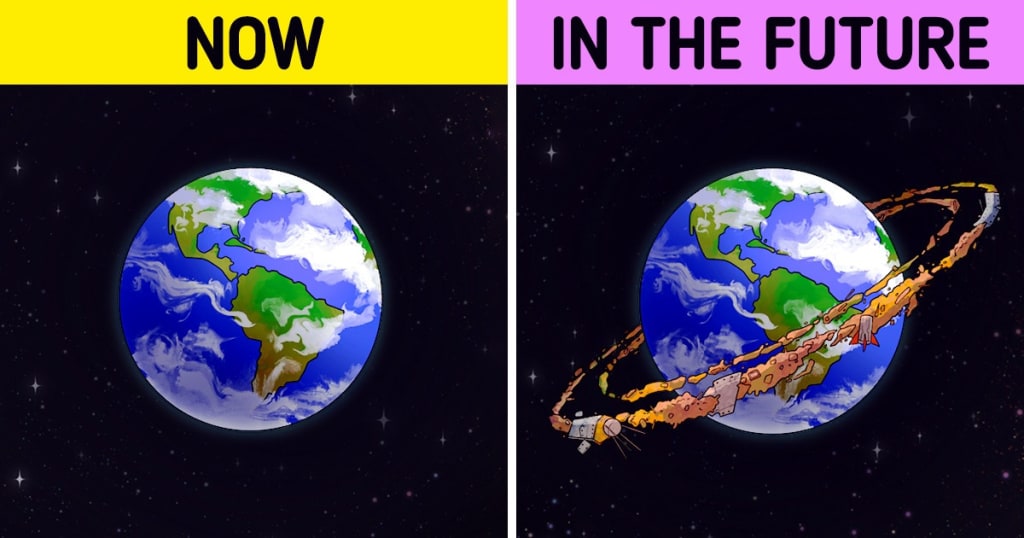What is the Future of Earth?
Talk on the future of Earth

Earth is the third planet from the Sun and the only astronomical object known to harbor life. According to radiometric dating and other sources of evidence, Earth formed over 4.5 billion years ago. Earth's gravity interacts with other objects in space, especially the Sun and the Moon, Earth's only natural satellite. Earth revolves around the Sun in 365.26 days, a period known as an Earth year. During this time, Earth rotates about its axis about 366.26 times.
Earth's axis of rotation is tilted with respect to its orbital plane, producing seasons on Earth. The gravitational interaction between Earth and the Moon causes ocean tides, stabilizes Earth's orientation on its axis, and gradually slows its rotation. Earth is the densest planet in the Solar System and the largest of the four terrestrial planets.
Earth's lithosphere is divided into several rigid tectonic plates that migrate across the surface over periods of many millions of years. About 71% of Earth's surface is covered with water, mostly by oceans but also by lakes, rivers and other fresh water, which together constitute the hydrosphere. Earth's atmosphere is divided into several layers and contains gases such as nitrogen, oxygen, and argon.
Earth has evolved many of its surface features over billions of years, including its landscape, climate, and life forms. Life on Earth has been present for at least 3.5 billion years, and its diversity has expanded ever since. About 1.2 million species of living organisms have been identified and named, of which about 1 million are insects. Humans are the only extant members of the hominin branch of the Hominidae family, a branch of the great ape family that includes gorillas, chimpanzees, and bonobos.
Humans are uniquely adept at utilizing systems of communication for self-expression and the exchange of ideas, and they have created complex social structures composed of many cooperating and competing groups. Human impacts on Earth's environment have been significant and ongoing, with humans now being a primary cause of ongoing extinction of many species, accelerated climate change, and pollution.
The physical and chemical properties of Earth, as well as its geological history and orbit, have allowed life to persist during this relatively stable period. In the next century or so, human impacts on the environment, including habitat destruction and global warming, are likely to accelerate, leading to significant changes in the biosphere and to the extinction of many species. Knowing what we know about Earth, it is important to take action to protect and preserve its environment for future generations.
What is Future of Earth?
The future of Earth is an important topic when it comes to understanding the impact humans have had, and will continue to have, on the planet’s environment. As the population of the world continues to increase and technology advances, the future of Earth is something that needs to be addressed.
In terms of the environment, the future of Earth depends on how humans handle the current environmental issues we are facing. It is clear that humans are the main cause of environmental damage and it is up to us to make sure that this damage is limited and reversed. There are a number of steps that can be taken, from reducing our reliance on fossil fuels to investing in renewable energy sources, that will help to reduce the negative impact humans have on the environment. Without taking these steps, the future of Earth is uncertain.
In terms of climate change, the future of Earth is likely to be significantly impacted by our current actions. The effects of climate change are already being seen, and the impacts are likely to be more pronounced in the future if we do not take steps to reduce our emissions. It is clear that we need to make drastic changes in our lifestyle in order to reduce our carbon footprint, and this includes investing in clean energy sources, improving energy efficiency, and reducing our consumption of energy.
The future of Earth also depends on how we handle the growing population. With more people on the planet, there is more strain on resources, leading to greater competition for land and resources. This competition can lead to conflicts between nations and people, as well as environmental degradation. To ensure that the future of Earth is secure, steps must be taken to ensure that resources are used responsibly and that population growth is managed in a sustainable way.
Finally, the future of Earth depends on how we handle the current ecological crisis. There is a need for us to work together to tackle global issues such as pollution, deforestation, and the loss of biodiversity. We need to focus on preserving our environment and make sure that the planet remains healthy for generations to come.
In conclusion, the future of Earth is uncertain, but it is in our hands to make sure that the future is secure and sustainable. We need to take steps to reduce our impact on the environment, manage population growth responsibly, and work together to tackle global issues. If we can do this then the future of Earth will be bright.





Comments
There are no comments for this story
Be the first to respond and start the conversation.